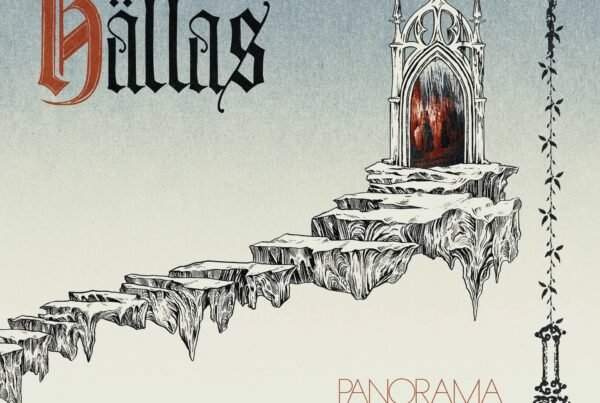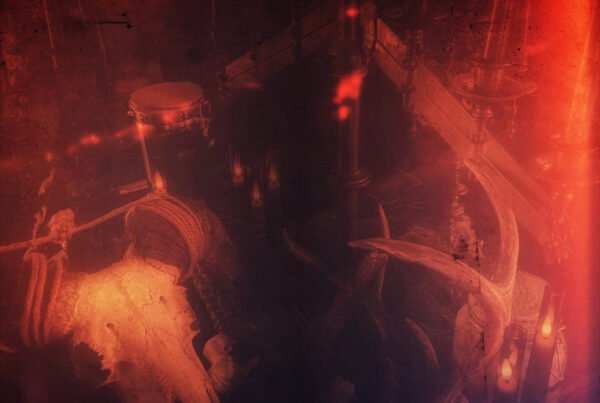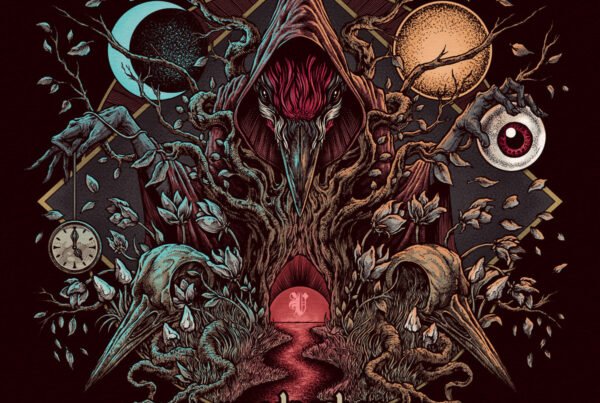On The Past Is Still Alive, Alynda Segarra marries Americana sounds with punk heart to create one of the most endearing projects of their long career, where the past isn’t past, but a crucial piece of the ever-changing people we are.
Release date: February 23, 2024 | Nonesuch Records | Bandcamp | Instagram | Twitter
Back in 2022, I began intently following album announcements and releases in an attempt to get more in touch with music outside what I already knew. One of the first records I heard once I set off on this mission was Hurray for the Riff Raff‘s 8th LP, LIFE ON EARTH. Veering away from the folk of their previous releases, LIFE ON EARTH saw front-person Alynda Segarra brandishing electric guitar and synth with aplomb as they crafted the album’s ‘nature punk’ sound. Although I like most of the record’s songs —”Rhododendron” and “Jupiter” are currently my favorites— I wasn’t able to connect emotionally as much as I would have wanted. So it surprised me when the first single off their follow-up, “Alibi”, was able to rope me in with such ease, with Segarra embracing Americana wholeheartedly as they plead to a friend to make the difficult decision of saving themselves. I was captivated by the song and felt identified with the emotional toil they sing about, in spite of the situation itself being so specific, so painfully personal to Segarra. By the time all pre-release singles had come out, my desire for the album’s release date to finally arrive turned into necessity: I felt so completely seen and held by those songs, I needed to be engulfed by them.
The Past Is Still Alive is an album that explores the past as a crucial and special part of our ever-changing selves; it is not a place we’ve left behind and should now pine after hopelessly, but a precious waypoint on life’s road. But the record’s emotional weight lies in how vulnerable Segarra allows themself to be, sharing stories from their past as well as the wonderful people who kept them company, no matter how briefly. Part of that vulnerability comes specifically from revisiting themself through the lens of their non-binary identity, these moments of queer understanding marked by a joyousness that felt so close to home to me, as I imagine they will to many queer people. Framed by the rich and expansive Americana Segarra crafted alongside producer Brad Cook —who also worked on LIFE ON EARTH and has produced great country-leaning records by the likes of Waxahatchee and Jess Williamson— and a host of wonderful collaborators (Anjimile, Meg Duffy, and Mike Mogis of Bright Eyes, to name a few) the songs ring out into the sky of a mythic American landscape stretching out to the horizon.
Having “Alibi” be the record’s opener as well as its first single is a brilliant choice because the song is a magnificent introduction to the sounds and sensibilities of The Past Is Still Alive as a whole. The song’s core is Segarra’s acoustic guitar, which lends “Alibi” a campfire sing-along kind of cadence that easily endears you to it. Accompanied by a simple rhythm section, pedal-steel and electric guitar add beautiful flourishes, most noticeably during the excellent choruses, night-blooming desert flowers mirroring the stars in the night sky. ‘You don’t have to die if you don’t want to die’ are the first words uttered on the album, a plea that echoes all the way from Segarra’s youth in New York City, when many of their friends were struggling with addiction. But whereas a young Alynda would try to bear the responsibility of being a savior, presently they are aware that although they can help in the process, they can’t save someone else: ”Cause you don’t have to die if you don’t want to die’, they repeat after an instrumental break that leads to the song’s outro, before concluding ‘But I’m not going to be your alibi / This time‘.”Alibi” is really astounding as a first try of what The Past Is Still Alive is because it shows that Segarra will pull no punches when it comes to the emotional vulnerability at the heart of these songs. These deeply personal stories, so specific to Segarra’s life, are crafted with such earnestness so as to elicit potent feelings of understanding and belonging. In spite of not having lived their life, one effortlessly sees themselves as both the pleader and the pleaded that we have been during our life.
“Hawkmoon” is the most directly rock moment on the album. A song-for-the-road driven by a bright and playful energy that steers it in a slightly different direction than the previous tracks, a constant forward momentum transmitted by the music and evoked by images of buses and cars. Segarra narrates the tough nomadic lifestyle that eventually led them to New Orleans —now their home— as a youth, as well as taking a jab at those born with silver spoons in their mouth (though Segarra advises they be used to gouge eyes out). But the song’s heart is in the memory of Miss Jonathan, the first trans woman that Segarra met and whose company, howsoever brief, proved to be so important on their outlook on life, not only on gender. ‘Oh, baby, where do you wanna go? / I know a place no one will ever know‘, are Miss Jonathan’s words, a promise of shelter that Segarra recalls in one of the loveliest vocal passages on the album, so full of light their voice almost shines.
I was lucky enough to catch Hurray for the Riff Raff on tour a few weeks after the album’s release. They fulfilled my wish by playing the album in its entirety, but the highlight in a night of highlights was no doubt the band’s rendition of “Colossus of Roads”, which has quickly become one of my favorite songs, full stop. Electric guitar, bass, and drums combined in a soft, mysterious build-up that had me wondering if they were playing a song I knew, before shaping themselves into the careful, steady rhythm, and lush and delicate layers of twangy chords and sliding bass I have become so intimate with in such a short time. “Colossus of Roads” (named after a pseudonym of the late American boxcar artist buZ blurr, who Segarra mentions in the lyrics) feels like a classic, a song you’ve heard so many times that its melody and lyrics come to you like second nature; it was only released in late January. And yet I feel like I have spent a lifetime in the company of this wondrous song, my heart cared for time and again by the tenderness of Segarra’s voice. ‘That’s one of those songs that just flowed out of me‘, they said in an interview with NPR. ‘It’s a song I wrote for queer people, for outsider communities, right after the Club Q shooting in Colorado.’ Each line of the song is a verse of pure poetry, plain-spoken yet containing such unbridled love and adoration, striving, as we do, to find romance in a hostile environment. I have adopted it as my queer anthem, and feel so lucky to have found it.
In a fun twist, The Past Is Still Alive has two title tracks. First, “Snake Plant (The Past Is Still Alive)” presents us with a tender yet unflinching account of Segarra’s youth riding trains across the US, the hardships faced as well as the deep connections created with the other travelers they met. The song is imbued with a bubbling sense of celebration by flourishes of baritone and tenor sax —courtesy of The Mountain Goats‘ Matt Douglas— that boil over in the song’s glorious conclusion as Segarra declares ‘Nothing will stop me now‘. It’s a cry that rings out with confidence, as if current Segarra were trying to psych up past Segarra, without whom the present would not exist. ‘It’s all in the past, but the past is still alive‘, they finally sing on the following song, the electrifying “Vetiver”; it’s a powerful moment, the impact of the phrase not even blunted by the fact it’s not the climax of the verse it features in. And even though the sentiment has been palpable throughout the album before this utterance, the energy stored in those five words is energizing.
It really pains me to not be able to go in-depth into each song, because all 10 are such unique and enriching experiences, but I must show some restraint. Entering the home stretch, we have “Hourglass” and “Dynamo”, a decidedly odd pair, as the former is the most fragile song on the album, whereas the latter is the most carefree and upbeat. “The World Is Dangerous” is a touching, melancholy declaration of love and hope, buoyed by gentle violins and featuring one of my favorite lyrics on the whole album, sung in unison with Connor Oberst in beautiful harmony: ‘Got to keep moving, it’s my life, I can’t lose it / A war correspondent, a wandering loser / I’ll light the candle and I’ll touch the flame / I won’t stop dreaming ’cause this world is dangerous.‘ The song’s soft resilience sets the stage perfect for the album closer, “Ogallala”, which ends The Past Is Still Alive with powerful, almost ecstatic, catharsis. It’s a sober track that surprisingly finds Segarra, and us as their contemporaries, watching the world burn, but accepting their place in time that allows them to witness tragedy and feel everything so deeply. Again, Matt Douglas’s sweet sax helps cut through the somberness of the moment with triumphant swells. ‘Meet me in the Autumn / In the garden / I’ll be waiting around’ are the album’s final words, a call for community to face the structures crumbling around us.
In some respects, The Past Is Still Alive feels like a friendship bracelet: crafted with absolute devotion and care, each song a unique bead on that precious string around your wrist, a touching reminder of times past as well as a constant companion as we continue to forge our path ahead. It truly is a special album, as Alynda Segarra traces a line through the stories and people of their past —always told with an admirable earnestness— to their present self and onward, delivered through some of the most endearing songs of their career, where Americana sounds and a punk heart combine to forge a loving document of outsider life.






